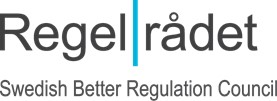
On 11-12 April, the OECD Regulatory Policy Committee (RPC) held its 26th session, a hybrid meeting where around half of its member countries attended physically in the OECD quarters in Paris. We talked to Christiane Arndt-Bascle, Head of Programme, Measuring Regulatory Performance, RPC Secretariat, about the results of the latest OECD report on regulatory performance, the 2021 Regulatory Policy Outlook (RPO), and better regulation issues in general.
“Sweden should have higher ambitions”
Christiane states that Sweden has not moved upwards in the most recent RPO ranking since the measuring started and that we in several aspects are below the OECD average. According to her, Sweden should be more ambitious. The recommendations for improvement to Sweden focus on a more interactive consultation process and strengthened ex post evaluations. Christiane says that the recommendations are quite generally held. To provide tailor-made advise, it is necessary to perform an in-depth country review. Besides providing support to the country for review, it also gives the OECD and peers from other countries a deeper understanding of how the different national systems work in practice and provides a source of inspiration. Christiane mentions that the Netherlands, for instance, has significantly improved their system with support from the OECD.
”Every law is an experiment”
Christiane finds it surprising that the resources for better regulation tools, such as regulatory impact assessment (RIA) and consultation, are so limited in many countries. The importance of RIA can not be underestimated. Assessing alternative solutions and effects during the drafting process, and consulting with stakeholders, are key to successful law making. The societal costs of bad regulation outweigh by far the costs of tools that provide evidence to decision-makers to ensure policy solutions deliver on their promises. The recent pandemic also taught us that there is no time to get emergency measures wrong. It is further vital with a policy cycle perspective, Christiane continues, meaning that besides RIA and consultation, the systematic evaluation of existing rules is equally important. Do the rules function properly in practice? Is there a need for finetuning? Which rules are obsolete or perhaps even counterproductive? Christiane says that she appreciates the fact that the better regulation agenda is about improving the quality and design of regulations on issues of relevance for policy-making across the political spectrum. Parties could therefore benefit from using better regulation tools and pick up results of ex-post evaluations to inspire reforms.
The importance of feedback to stakeholders
Christiane underlines the importance of trust in regulation and regulators, to which solid and systematic consultation processes are crucial. Most stakeholders can accept rules – and associated costs – if they understand what purpose they serve and how their views expressed in consultations have been taken into account. To promote trust and compliance, the existence and frequent use of feed back mechanisms are helpful tools.
Challenges and potentials for the future
Christiane states that the fast development of new technology gives rise to both challenges and possibilities. Artificial intelligence can, for example, be used in reviewing the existing stock of regulation. She underlines the need to include a wide spectrum of aspects in RIAs and evaluations, not the least impacts on innovation and climate change. She stresses the need for strategic foresight, risk proportionality and international regulatory cooperation as well as the role of regulatory oversight bodies to contribute to high quality legislation. The world changes quickly and legislators have to act more agile in the future. The OECD’s new Recommendation of the Council for Agile Regulatory Governance to Harness Innovation aims to help countries with this. To this end, there is a need for the upgrading of skills, both within governments and within regulatory oversight bodies, she concludes.
For more information
OECD Regulatory Policy Committee (RPC)
OECD-RPC was created in 2009 to assist member and non-member countries in building and strengthening their regulatory policy of reform efforts. The RPC assists members and partners to promote strategic, evidence-based and innovative public policy outcomes, supporting efforts across governments to design and deliver effective regulatory frameworks. It examines what governments and regulatory agencies do and how they seek to improve regulatory reform.
Read more
The Regulatory Policy Outlook (RPO)
RPO maps, measures and ranks how well member countries comply with OECD 2012 recommendation on Regulatory Policy and Governance. It is published every third year and issues general and country specific recommendations, describes trends and gives examples of best practices.
Read the latest report
